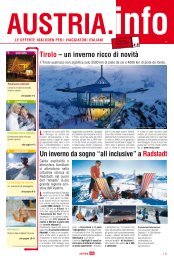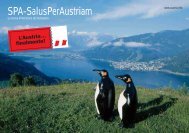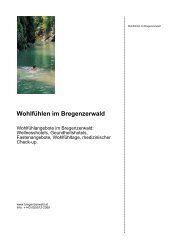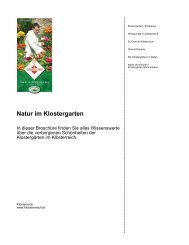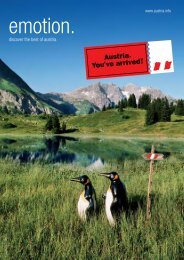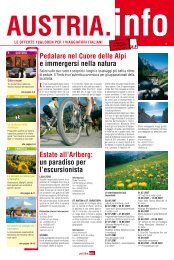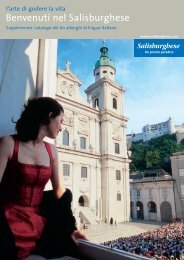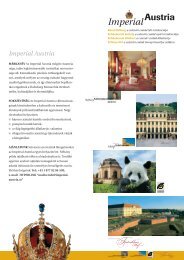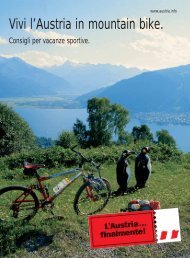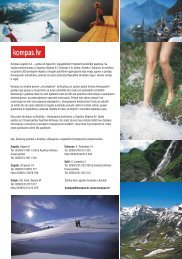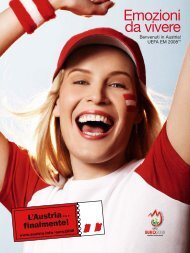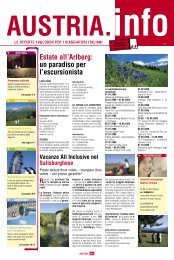Create successful ePaper yourself
Turn your PDF publications into a flip-book with our unique Google optimized e-Paper software.
GRAZ TOURISMUS<br />
from springs, rivers and lakes – most of which is already perfectly drinkable water. Moreover, in many national parks naturally<br />
pure, crystal-clear water bubbles right out of the ground and is bottled just how it is. This way it stays fresh right to the supermarket<br />
shelf. By the way, when hiking through the Austrian mountains, always be sure to have a bottle with you: for your own<br />
use you can fill it with as much cold, clear water as it will hold.<br />
<strong>Culture</strong> in Graz<br />
Why the city on the Mur River breathes culture.<br />
Innovation has a long tradition in Graz. And this is no contradiction in<br />
terms. Literary luminaries like Peter Handke, Wolfgang Bauer, Alfred Kolleritsch,<br />
Barbara Frischmuth and Elfriede Jelinek – later the recipient of the<br />
Nobel Prize – made the Forum Stadtpark, founded in 1960, famous. The<br />
brilliant playwright Werner Schwab continued this success story into the<br />
1990s. Another legendary institution is the Graz School of Architecture,<br />
which, particularly in the 1980s, was regarded as something of a phenomenon<br />
in the international scene. Some of the leading representatives of<br />
this group, such as Günther Domenig, Klaus Kada and the duo Szyszkowitz-<br />
Kowalski, have left their imprint on Graz’s cityscape and added outstanding<br />
modern accents to the architecturally rich Old Town.<br />
The newest and also most prominent witnesses to this bold marriage of<br />
old and new – Peter Cook and Colin Fournier’s Kunsthaus Graz and Vito<br />
Acconci’s Mur Island – are not by members of the Graz School, but with<br />
their playfully innovative, biomorphic forms, they nevertheless represent a<br />
continuation of what the Graz School stood for.<br />
Graz – The Cultural Capital. Its reputation as a lively, vital city of culture<br />
was the reason that in 2003 Graz was the first Austrian city to receive the<br />
title “European Cultural Capital”. The great success of the “Graz 2003 –<br />
European Cultural Capital” project, however, was due to the unique flair<br />
of the city and its openness to new things – as well as to the neighbours to<br />
the east. And these qualities have been intensified since 2003.<br />
music.<br />
styria<br />
This is why even today Graz calls itself the “Cultural Capital”.<br />
This is not about cultural showing-off, and not about outdoing others with<br />
high-profile events; rather, it’s about a kind of culture that is lived out, celebrated<br />
and enjoyed.<br />
• Every spring the DIAGONALE is kicked off: the festival of Austrian film.<br />
• Also in the spring: the “springfestival” for electronic art and music, the<br />
leading event of its kind in Austria.<br />
• The “styriarte” festival concerns itself with new approaches to early<br />
music. Which is also the guiding philosophy of its artistic director, Nikolaus<br />
Harnoncourt.<br />
• And Graz is ruled by jazz as well. This is evidenced by events like the annual<br />
“Jazz Summer”: all-star jazz with big events at small prices.<br />
• At the street and puppet-theatre festival La Strada, held every summer,<br />
the world’s top street artists descend on Graz.<br />
• The annual “steirischer herbst” festival presents the very latest in international<br />
art trends.<br />
This selection of festivals represents only a few of the annual highlights of<br />
the cultural calendar.<br />
Info & bookings.<br />
Graz Tourismus<br />
Tel. +43 (0)316/80 75-0<br />
info@graztourismus.at<br />
www.graztourismus.at<br />
15



